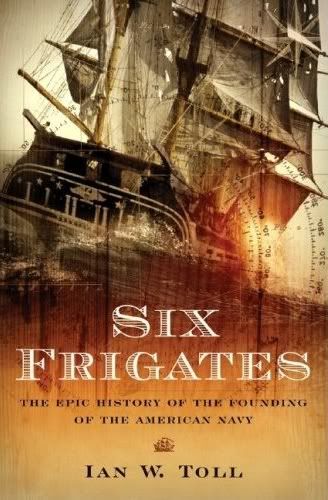Book Review: Six Frigates: The Epic History of the Foundation of the U.S. Navy

Book Review: Six Frigates: The Epic History of the Foundation of the U.S. Navy
Author: Ian W. Toll
Review Date: December 23, 2006
Six Frigates is about the early beginnings of the U.S. Navy, primarily from its post-War of Independence roots. It also satisfied my craving for a book not assigned for a university and doubly so as this book is clearly not an exercise in academic scholarship.
This book is the author’s first. Ian W. Toll, whom I have never heard of and his back-flap biography gives no indication why he would be writing this book, except for his own pleasure. This is apparent, as he clearly put a great deal of effort into his research. The mention and even quotation of Patrick O’Brian, while making me think just a little less of Toll as an amateur historian, shows me that Toll’s interest in the subject is similar to my own. A guy who has been reading the fictional side of these events, who then decided to delve into the non-fiction. I read the non-fiction, he decided to write it.
While his scholarship is in doubt, Toll does know how to write and he does so clearly and without bias. Bias has to be kept in mind because the time period he is examining was, naval wise, almost completely dominated by the British Navy. By Toll’s own estimation the British Navy of Nelson is perhaps the greatest navy to have ever existed, and he has a point. With this in mind Toll keeps the not inconsiderable accomplishments of the new American navy in perspective, without turning it into a diatribe against the British Navy, or hagiography for the U.S. Navy.
But, in a notable portion of his book was his description of the Battle of Bladensburg during the War of 1812. A very odd paragraph, that sticks out with its absolutely fantastical assertions, which I shall quote in depth:
The Battle of Bladensburg, also known as the Bladensburg Races, was by far the most ignominious defeat suffered by an American army in the field, up to that time and ever since. In fairness, however, it should be said that the retreat highlighted the distinctive traits of Yankee ingenuity and self-reliance. Realizing there was no time, in all the confusion, to check in with their commanding officers, the soldiers and militia did not wait to be told to run for their lives. They knew a man could move faster when not burdened with weapons, ammunition, and extra gear, so they left most of it behind. Sensing that if they all ran away in the same directions, the British would follow and attempt to renew the battle, they split up into small groups took different routes of escape…
Maybe Toll is just an optimist, but the exercising of “Yankee ingenuity and self-reliance” seems like an undignified rout of lesser soldiers by better ones. Hardly an occasion that one needs “Yankee ingenuity and self-reliance” when what one really needs is a fast horse. Aside from that one weird paragraph-which even now seems to reach up with its ludicrousness, where was the editor? - Toll keeps his writing balanced.
As for content, Toll addresses the early accomplishments of the U.S. Navy, including the little known Quasi-War and the Tripolitan War, of “shores of Tripoli” fame. He also includes a lot of information regarding the titular Six Frigates of the U.S. Navy (of which the USS Constitution still exists). Not simply of accomplishments too. Toll starts from the very beginning of the six frigates, from their inception as a Congressional appropriation bill, to their design and finally their construction. He wryly notes that the dispersed construction sites of the frigates were possibly the first occasion of pork barrel politics in the U.S. history.
He also devotes a great deal of his book to the political climate surrounding early U.S. Navy with pro-navy Federalists and anti-navy Republicans. This political theme is prevalent throughout the book as the ebbs and flows in the international context, in turn leads to ebbing and flowing in the political discourse of the navy.
Toll also puts in a great deal a commentary about the officers of the early navy, focusing mostly on the senior ship commanders. In fact, he devotes very little time to the enlisted men, beyond select quotations and generalizations. His entire book is similar, focusing on the bigger personalities and political history rather than the rank and file.
Toll makes no grand assertions, and has no major thesis. He sets out to write the how and what, with a small portion of the why. For a person who is a bit interested in the early U.S. Navy, that’s just fine. For some light reading though, I doubt Six Frigates will be for most people’s tastes. Overall though Six Frigates is a fine book. 7/10.